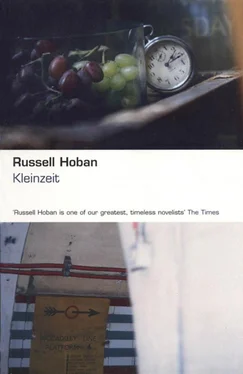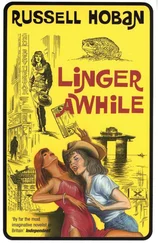Russell Hoban - Kleinzeit
Здесь есть возможность читать онлайн «Russell Hoban - Kleinzeit» весь текст электронной книги совершенно бесплатно (целиком полную версию без сокращений). В некоторых случаях можно слушать аудио, скачать через торрент в формате fb2 и присутствует краткое содержание. Год выпуска: 2002, Издательство: Bloomsbury, Жанр: Современная проза, на английском языке. Описание произведения, (предисловие) а так же отзывы посетителей доступны на портале библиотеки ЛибКат.
- Название:Kleinzeit
- Автор:
- Издательство:Bloomsbury
- Жанр:
- Год:2002
- ISBN:нет данных
- Рейтинг книги:4 / 5. Голосов: 1
-
Избранное:Добавить в избранное
- Отзывы:
-
Ваша оценка:
- 80
- 1
- 2
- 3
- 4
- 5
Kleinzeit: краткое содержание, описание и аннотация
Предлагаем к чтению аннотацию, описание, краткое содержание или предисловие (зависит от того, что написал сам автор книги «Kleinzeit»). Если вы не нашли необходимую информацию о книге — напишите в комментариях, мы постараемся отыскать её.
The Peloponnesian War
Kleinzeit — читать онлайн бесплатно полную книгу (весь текст) целиком
Ниже представлен текст книги, разбитый по страницам. Система сохранения места последней прочитанной страницы, позволяет с удобством читать онлайн бесплатно книгу «Kleinzeit», без необходимости каждый раз заново искать на чём Вы остановились. Поставьте закладку, и сможете в любой момент перейти на страницу, на которой закончили чтение.
Интервал:
Закладка:
POEMS 10P
He taped the yellow paper and the two poems to the wall of the corridor, sat down on his chair pad, played green turtle and Golden Virginia Tobacco tin music on the glockenspiel.
Some people read the poems without buying them and without dropping money in the glockenspiel lid. Some dropped money but did not buy poems. After a while both poems were bought. Kleinzeit made new copies, taped them to the wall. By lunchtime he’d sold six copies of the green turtle poem and four of the Golden Virginia Tobacco tin one, had taken in £ 1.75 altogether. When Thucydides found me I was nothing, he thought. Look at me now.
The afternoon was fat with tourists. Some of them photographed him after buying a poem. Never mind, thought Kleinzeit. If Homer had gone busking in the Underground they’d have taken his picture too. After the evening rush he counted up the day’s take. £ 3.27 and a key.
Kleinzeit examined the key. Not one of his, and he hadn’t seen anyone drop it. A Yale copy, made from a brass blank. For STAFF ONLY, like Redbeard’s? Redbeard had got his key from the yellow-paper man before him, who had very likely been Flashpoint. Flashpoint had passed his key along and died in hospital. When Redbeard had given up yellow paper they’d changed the STAFF ONLY lock. Now a key for Kleinzeit. From whom? He tried to call to mind all the people who had passed during the day. Redbeard, for that matter, was he possibly an eccentric millionaire who maintained a STAFF ONLY for yellow-paper men, and his talk of being locked out was just a way of testing Kleinzeit? Kleinzeit felt a surge of well-being through his whole system. Not alone! Somebody looking after him, giving him a key! Maybe not a STAFF ONLY. Maybe a woman? But then there would have been a note to tell him where the door was. Couldn’t be a woman. A patron of some kind was what it had to be. A patron! Kleinzeit saw in his mind a photograph of himself on the back of a book jacket. Cocktail parties, beautiful eager women, not taking Sister’s place of course, but extra.
Before going home he tried STAFF ONLY, PRIVATE, HIGH VOLTAGE and NO ADMITTANCE. The key did not unlock any of those doors. He could try other stations of course. There was no hurry, the main thing was the fact of the key itself.
Kleinzeit got into a train and went home. He considered writing one or two new poems for tomorrow, now felt comfortably under observation, someone keeping an eye on him. Lovely. He read Thucydides, got to page 32, felt that it was doing him good. He could recall almost nothing of whatever ancient history he had learned at school, had never gone to university. He looked forward with keen interest to the consequences of the trouble over Epidamnus, wondered who would win the oncoming war. The representatives of both Corinth and Corcyra sounded wonderfully reasonable in their speeches to the Athenians, but of course one never knew. The book was of a pleasing thickness to hold in the hand, the detail of the vase painting on the cover was marvellous, the vertical white cracks in the glossy black paper of the spine marked his progress, gave him a sense of achievement. And at home his plain deal table, his bare room and his candle were waiting. Greatness touched him like the prickling of fog on the skin. In the plastic Ryman bag the yellow paper softly growled. In his pocket the new key lay with his keys and the key that Sister had given him. Doors, doors!
Schwarzgang maybe, he thought walking from the Underground to his flat. Maybe Schwarzgang was the eccentric millionaire who laid on STAFF ONLYS for the yellow-paper men, maybe Schwarzgang had himself been a yellow-paper man who, old and broken now, passed on the torch while blipping in his bed, revoked failed Redbeard’s privileges and sent someone to drop the key in Kleinzeit’s glockenspiel lid. Kleinzeit saw in his mind a dedication: To my friend Schwarzgang, who … Dedication of what? Ah! Kleinzeit winked at the golden windows of the evening. Wait and see.
He made scrambled eggs for supper, smiled as he thought of the yellow paper waiting for him, how he would throw himself upon it like a tiger. Rape. The yellow paper would love it. Redbeard simply hadn’t been man enough. He dawdled over his coffee, took his time clearing up.
Kleinzeit went into the living-room rubbing his hands and chuckling, lit the candle, stripped the flimsy Ryman bag from the yellow paper. The yellow paper lay before him naked. Yes yes oh yes, it murmured. Never like this before, no one like you before. Yes yes oh yes. Now now now.
Plenty of time, said Kleinzeit. No hurry. He covered the yellow paper, emptied the ashtray, put Thucydides on the plain deal table and read by candlelight. It’s there, he thought. When I’m ready I’ll take it. No hurry, plenty of time.
In the book the Corinthian fleet engaged the Corcyraeans at dawn off Sybota. Kleinzeit smelled the salt morning on the Aegean. The rowers’ benches, the oar looms, the rigging would be cold and wet with dew, the white foam hissing past the pointed rams, the striped sails on the dawn-grey sea growing large on the horizon. He lost the reality of it in the printed details, emerged on page 67 to find that both sides claimed the victory and put up a trophy on Sybota. Kleinzeit shook his head, he had expected things to be more clearly defined in the ancient world. I’ll be with you in a minute, he said to the yellow paper, went on reading. On page 75 the Corinthian representative said to the Spartans:
‘… you have never yet tried to imagine what sort of people these Athenians are against whom you will have to fight — how much, indeed how completely different from you. An Athenian is always an innovator, quick to form a resolution and quick at carrying it out.
That’s the way to be, thought Kleinzeit.
‘You, on the other hand, are good at keeping things as they are; you never originate an idea, and your action tends to stop short of its aim. Then again, Athenian daring will outrun its own resources; they will take risks against their better judgement, and still, in the midst of danger, remain confident.
From now on that’s how I’m going to be, said Kleinzeit to Thucydides.
‘But your nature is always to do less than you could have done, to mistrust your own judgement, however sound it may be, and to assume that dangers will last forever.
Really, said Kleinzeit, I haven’t done all that badly. I bought the glockenspiel, fell in love with Sister, left the hospital, made £ 3.27 today all by myself, sold poems.
‘Think of this, too: while you are hanging back, they never hesitate; while you stay at home, they are always abroad; for they think that the farther they go the more they will get, while you think that any movement may endanger what you have already. If they win a victory, they follow it up at once, and if they suffer a defeat, they scarcely fall back at all. As for their bodies, they regard them as expendable for their city’s sake, as though they were not their own;
Look here, said Kleinzeit, I am expending my body. Didn’t I leave the hospital without the operation? God knows at what rate I’m falling apart now. You can’t say I’m not being Athenian.
‘but each man cultivates his own intelligence, again with a view to doing something notable for his city. If they aim at something and do not get it, they think that they have been deprived of what belonged to them already; whereas, if their enterprise is successful, they regard that success as nothing compared to what they will do next.
I promise, said Kleinzeit to his dead mother, I’ll be, I’ll make, I’ll do. You’ll be proud of me.
‘Suppose they fail in some undertaking; they make good the loss immediately by setting their hopes in some other direction. Of them alone it may be said that they possess a thing almost as soon as they have begun to desire it, so quickly with them does action follow upon decision. And so they go on working away in hardship and danger all the days of their lives, seldom enjoying their possessions because they are always adding to them. Their view of a holiday is to do what needs doing; they prefer hardship and activity to peace and quiet. In a word, they are by nature incapable of either living a quiet life themselves or of allowing anyone else to do so.’
Читать дальшеИнтервал:
Закладка:
Похожие книги на «Kleinzeit»
Представляем Вашему вниманию похожие книги на «Kleinzeit» списком для выбора. Мы отобрали схожую по названию и смыслу литературу в надежде предоставить читателям больше вариантов отыскать новые, интересные, ещё непрочитанные произведения.
Обсуждение, отзывы о книге «Kleinzeit» и просто собственные мнения читателей. Оставьте ваши комментарии, напишите, что Вы думаете о произведении, его смысле или главных героях. Укажите что конкретно понравилось, а что нет, и почему Вы так считаете.












